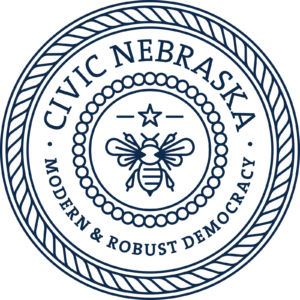You can find the phrase “modern and robust democracy” throughout Civic Nebraska’s work. We believe in the power of this phrase so much, in fact, it’s on our organization’s logo. On occasion we are asked what exactly we mean by it. What is a modern and robust democracy in the 21st century?
We’re glad you asked. Simply put, we measure the modernity and robustness of a democracy by how well it upholds various interrelated principles that make life better for everyone. Here are a dozen of them.
1. Broad, inclusive participation
A modern, robust democracy ensures that all eligible citizens have the right to participate in the political process. This includes the right to vote in free and fair elections, run for office, and engage in political activities without discrimination.
2. Respect for the rule of law
The rule of law is fundamental to a modern and robust democracy. It means that laws apply equally to all citizens, including those in positions of power, and that legal processes are fair and just. This helps prevent arbitrary use of power and promotes a stable and predictable legal environment.
3. Protection of human rights
A strong democracy upholds and protects fundamental rights and freedoms. This includes freedom of speech, assembly, religion, and other basic human rights. Legal frameworks and institutions are in place to safeguard these rights.
4. Transparency and accountability
Transparency in government operations, decision-making processes, and public policy is crucial for a modern, robust democracy. An accountable government is responsive to the needs of its citizens, and mechanisms are in place to hold public officials accountable for their actions.
5. Free, independent media
A modern and robust democracy does not fear – and in fact, goes to great length to support – a free and independent media that serves as a watchdog, providing residents with accurate and unbiased information. This enables an informed populace while holding those in power accountable.
6. Competitive elections
Regular and competitive elections are a cornerstone of democracy. Elections should be conducted fairly, with multiple political parties offering diverse choices for voters. The electoral system should be designed to ensure representation and prevent the concentration of power.
7. Strong civil society
A vibrant civil society, including nonprofits and grassroots movements, plays a big role in holding the government and elected leaders accountable while advocating for the interests of the people.
8. Distribution of power
Distributing power across various levels of government helps prevent the concentration of authority. State governments as well as municipal authorities should have a degree of autonomy and decision-making power.
9. An educated and informed populace
A modern and robust democracy requires an educated and informed citizenry. Schools and civic organizations play a role in promoting civic awareness, critical thinking, and an understanding of democratic principles.
10. Minority rights
A modern and robust democracy recognizes pluralism and safeguards the rights of minority groups. This ensures they have equal opportunities, representation, and protection against discrimination.
11. Peaceful conflict resolution
Modern and robust democracies have norms and mechanisms in place for resolving conflicts peacefully, both within the political system and in society at large. This can include a fair and independent judiciary for all, on up to the peaceful transfer of power between elected officials and their successors.
12. Flexibility and adaptability
A modern and robust democracy adapts to changing circumstances and challenges. It embraces innovation in governance, technology, and public participation to improve its functioning.
Democracy derives its resilience from our ability to learn from our shortcomings, adapt to new realities, and foster a sense of shared responsibility. In this sense, democracy is never static. It will and must continue to unfold in new ways, through our collective effort to form a more just, inclusive, and participatory society – or, in other words, to form a more perfect union.
![]()


